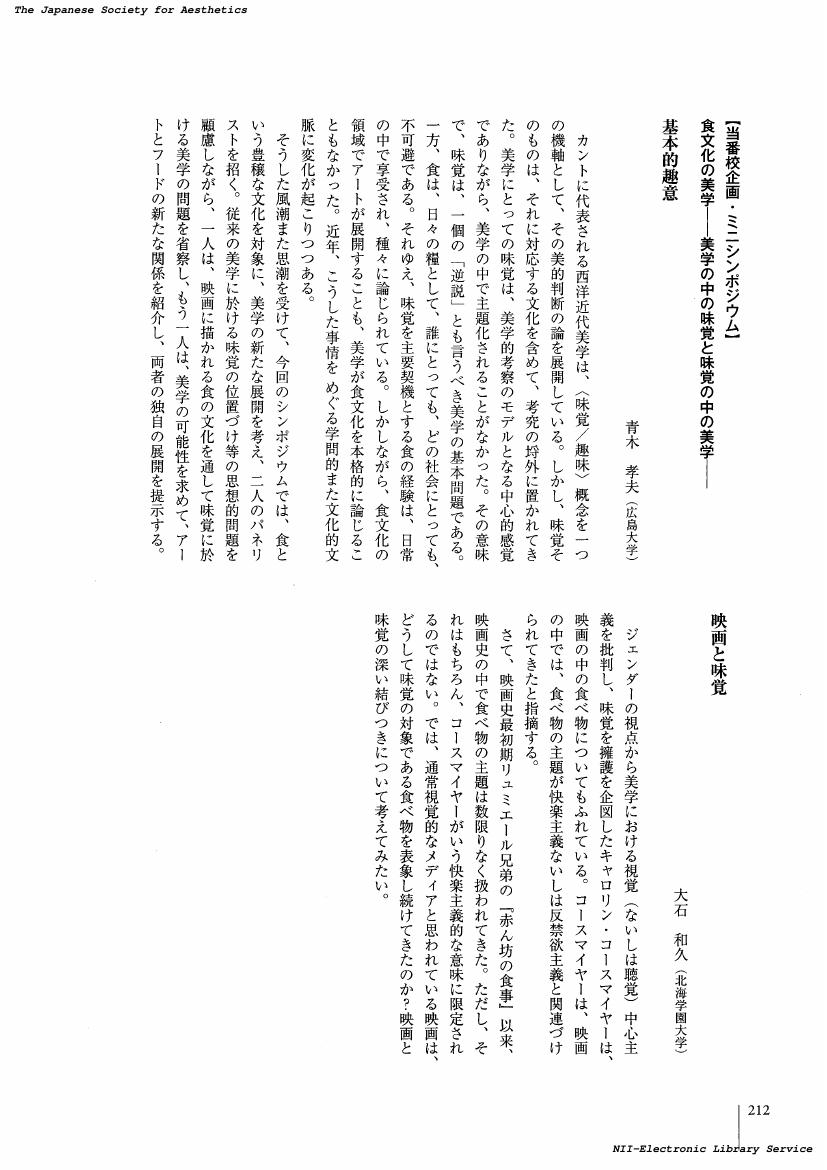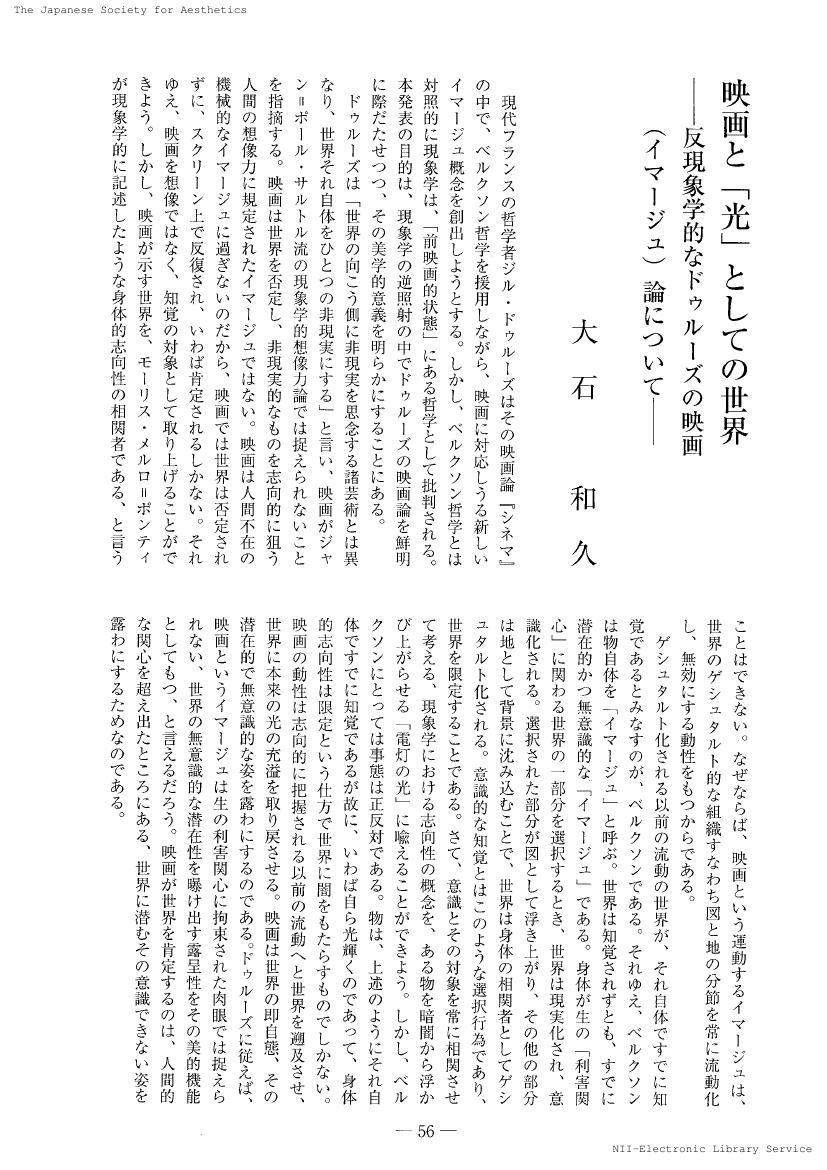4 0 0 0 IR アンドレ・バザンの映画批評とベルクソン哲学
- 著者
- 大石 和久
- 出版者
- 北海学園大学大学院文学研究科
- 雑誌
- 年報新人文学 (ISSN:18831524)
- 巻号頁・発行日
- no.5, pp.126-157, 2008-12-31
1 0 0 0 IR ドゥルーズの黒澤論について 〈問いの形而上学〉としての黒澤映画
- 著者
- 大石 和久
- 出版者
- 北海学園大学人文学会
- 雑誌
- 北海学園大学人文論集 (ISSN:09199608)
- 巻号頁・発行日
- no.22, pp.35-59, 2002-07
1 0 0 0 OA ベルクソンと映画 ミシェル・ジョルジュ=ミシェルによる二つのインタビューをめぐって
- 著者
- 大石 和久
- 出版者
- 美学会
- 雑誌
- 美学 (ISSN:05200962)
- 巻号頁・発行日
- vol.68, no.2, pp.164, 2017 (Released:2019-01-02)
- 著者
- 大石 和久
- 出版者
- 美学会
- 雑誌
- 美学 (ISSN:05200962)
- 巻号頁・発行日
- vol.66, no.1, pp.212, 2015-06-30 (Released:2017-05-22)
1 0 0 0 OA 瞬間と持続 : 写真とベルクソニスム
- 著者
- 大石 和久
- 出版者
- 美学会
- 雑誌
- 美学 (ISSN:05200962)
- 巻号頁・発行日
- vol.64, no.1, pp.35-46, 2013-06-30 (Released:2017-05-22)
Henri Bergson states that "duration", which cannot be fragmented into instants, has reality, and that the instants themselves are unreal. Herein lies the difficulty of discussing the photograph from a Bergsonist viewpoint. To solve this problem, this paper proposes that Bergson treats the "any-instant-whatever" as a kind of duration, but one which is without memory, and is therefore extremely expanded. In contrast, subjective human perception is a condensing of myriads of instants via the memory, and is therefore a contracted duration. Without memory, the any-instant-whatevers return to themselves, and become objective. This paper proposes that the camera, being only physical matter without human memory, reveals the any-instant-whatever that had become indistinguishable in the contracting memory. From this viewpoint, the photograph is objective in its instantaneity, revealing instantaneous "differences" that are "useless" for human beings; Bergson recognizes that "revelation" is a function of art. Thus, the "optical unconscious" revealed instantaneously by the photograph, refers not to psychological reality, but to the objective (material) world.
- 著者
- 大石 和久
- 出版者
- 美学会
- 雑誌
- 美学 (ISSN:05200962)
- 巻号頁・発行日
- vol.56, no.3, pp.56, 2005-12-31 (Released:2017-05-22)
1 0 0 0 IR 映画を語るベルクソン : 「アンリ・ベルクソンが映画について語る」翻訳と注釈
- 著者
- 大石 和久 OISHI Kazuhisa
- 出版者
- 北海学園大学人文学会
- 雑誌
- 北海学園大学人文論集 (ISSN:09199608)
- 巻号頁・発行日
- no.61, pp.1-22, 2016-08
1 0 0 0 瞬間と持続 : 写真とベルクソニスム
- 著者
- 大石 和久
- 出版者
- 美学会
- 雑誌
- 美學 (ISSN:05200962)
- 巻号頁・発行日
- vol.64, no.1, pp.35-46, 2013-06-30
Henri Bergson states that "duration", which cannot be fragmented into instants, has reality, and that the instants themselves are unreal. Herein lies the difficulty of discussing the photograph from a Bergsonist viewpoint. To solve this problem, this paper proposes that Bergson treats the "any-instant-whatever" as a kind of duration, but one which is without memory, and is therefore extremely expanded. In contrast, subjective human perception is a condensing of myriads of instants via the memory, and is therefore a contracted duration. Without memory, the any-instant-whatevers return to themselves, and become objective. This paper proposes that the camera, being only physical matter without human memory, reveals the any-instant-whatever that had become indistinguishable in the contracting memory. From this viewpoint, the photograph is objective in its instantaneity, revealing instantaneous "differences" that are "useless" for human beings; Bergson recognizes that "revelation" is a function of art. Thus, the "optical unconscious" revealed instantaneously by the photograph, refers not to psychological reality, but to the objective (material) world.
1 0 0 0 IR 北海道と映画 : 北海道の表象とそのアイデンティティ
- 著者
- 大石 和久
- 出版者
- 北海学園大学
- 雑誌
- 開発論集 (ISSN:0288089X)
- 巻号頁・発行日
- vol.75, pp.49-63, 2005-03-31
1 0 0 0 映像,あるいは人間を超え出る知覚について : ベンヤミン/ベルクソン/連続写真 (退職記念 井上真蔵 池内靜司教授) -- (北海学園大学人文学会創立記念シンポジウム 記録 人文学の新しい可能性)
- 著者
- 大石 和久
- 出版者
- 北海学園大学人文学部
- 雑誌
- 北海学園大学人文論集 (ISSN:09199608)
- 巻号頁・発行日
- no.58, pp.128-141, 2015-03


